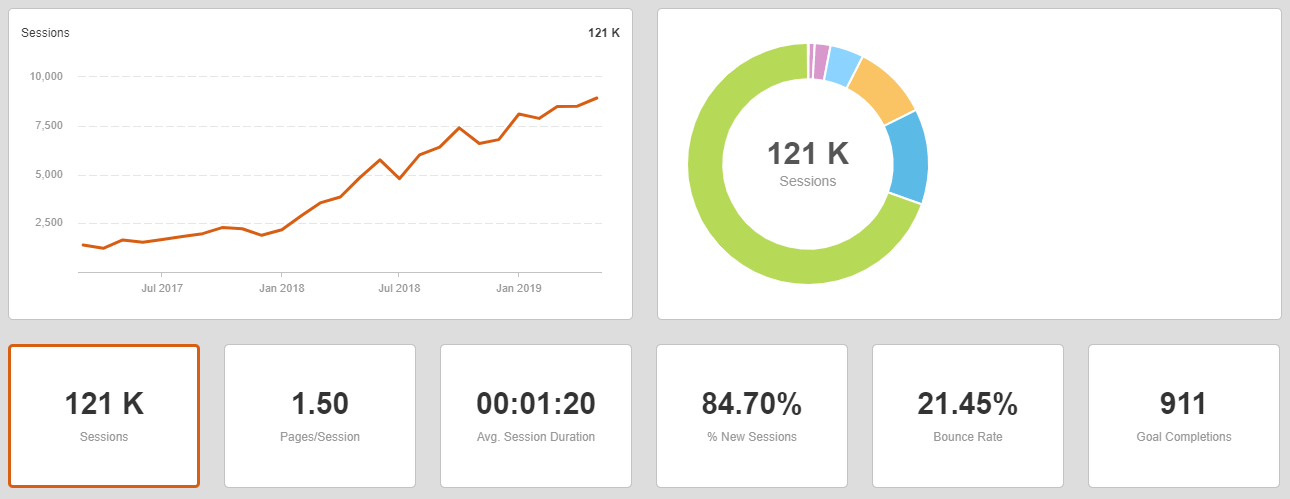The benefits of business blogging have been well-documented over the years. Businesses that blog drive more traffic to their websites, are more well-known within their industry, and have better long-term marketing and sales results. If you are ready to start a blog for your business, one of the first decisions you need to make is where to put it. There are two main options: making the blog a part of your existing website or creating an entirely new website just for the blog. Which is the better choice? In our opinion, your blog should always be a part of your main website. Here’s why:
SEO Benefits
There are a few different reasons why making your blog a part of your website is more beneficial to your ranking than allowing it to stand alone. The first reason has to do with backlinks. If another website backlinks to one of your blog posts, this backlink will help your entire website rank higher in search results. However, if your blog is on a separate website, the backlink would only affect the ranking of the blog website, not your company’s main site.
Likewise, links to other parts of your website will benefit your blog as well. A metric called domain authority measures from 0 to 100 the strength of your domain compared to others as it related to backlinks. The higher your domain authority, in general, the higher your website and page are going to rank in search results. Since your business website likely already has some domain authority, why start your blog from 0 on a separate site?
The blog content is also crucial to your company’s SEO strategy. A huge part of ranking within search results is identifying important keywords and incorporating them into your website’s content. Blogs are a great way to incorporate these keywords, so without a blog on your main website, you won’t have much of a chance to rank for your targeted keywords.
For example, many of our clients see the vast majority of their traffic enter their website through their blog. This is due to the fact that while competitive keywords are important, long tail keywords often drive the vast majority of traffic to any website. Think about it — nearly half of all searches on Google have never been performed before. That is a staggering number considering there are over 3 billion searches per day on Google alone!
The chart below shows one of our clients for whom we blog 3-4 times per month. Over a two year period, we saw their inbound blog traffic increase 4x compared to the start of the campaign, and more importantly they saw 911 leads just through those blog posts.

Google prefers websites that are rich in content and frequently publish new pages. Because of this, a blog that is updated on a regular basis can make your entire website more attractive to search engines. But, if you choose to host your blog on a separate website, your main website will remain static, which could negatively affect your ranking.
User Experience
Any qualified website designer will tell you that user experience is an important factor to consider when building a website. Users want to be able to navigate through your website to find the information they’re looking for with ease.
Creating separate websites for your company and your company’s blog will not lead to a positive user experience. Keeping everything on one website will make it much easier for users to click through to different areas of the website, read different blog articles, and then return back to your main page to find your contact information. Plus, today’s users have come to expect that every company website will have a blog. If they can’t find one when they visit your website, they may think less favorably of your company.
Additionally, when a blog is used as an SEO tool to drive inbound traffic, you want every opportunity possible to sell your brand and create a positive brand experience. If a user lands on a standalone blog, the chances of them interacting with your core website pages are much lower, and the branding experience will also be much lower.
Lower Traffic
One of the main goals for digital marketing is to drive traffic back to your company’s website. The more people click through to your website, the more you will sell. If driving traffic is important to you, it’s strongly recommended that you keep your blog and website together. Why? Companies that have blogs receive 55% more visitors than companies without blogs. That’s because the blogs are the pages that are driving traffic back to your main website. If you choose to separate your blog from your main site, you will be driving traffic to the blog page with no guarantee that the user will figure out who you are and how to visit your main page. Imagine losing 55% of your web traffic—that’s a significant drop that could affect your bottom line all because you chose the wrong location for your blog.
In our example above, we saw a 4x increase in traffic for this client due to blogging. We have a full case study on this client in our portfolio where we saw a 2000% increase in total traffic and a 700% increase in leads over just a 2 year period. This was in part due to ranking well for some competitive keywords, but the vast majority of our traffic was generated through blogging and long tail SEO keywords.
Had we created this blog as a standalone, we certainly still could have generated more traffic, but the traffic wouldn’t be living on their website. We gained all the benefits of having that traffic to the main site — including things like visitors interacting with the live chat on the site, visitors being added to the remarketing list for the website to serve ads to them, and visitors navigating around the site to learn more about the company.
In fact, this particular client as an example, saw a 21% bounce rate on blog content. That means that 4 out of 5 visitors on the site clicked around and navigated around the site!
Cost
It’s much more expensive to design, build, and maintain two separate websites than it is to keep up with a single website. Also, if you are spending money on pay-per-click ads, you will have to spend more to promote two websites if you separate your blog from your main website. Overall, it makes more financial sense to keep your blog on your main website than it does to pay more so you can have multiple websites.
While the setup of adding a blog to your main website may cost a little more initially than say setting up a blog on a free platform, the benefits far outweigh the costs. We often work with clients who don’t want to do a full redesign but just want to add a blog to their existing website. Depending on their CMS, if they are already in a CMS like WordPress or similar, designing blog templates and enabling the blog functionality of their site is typically just a few day project.
Branding
Branding one website is challenging enough, so why make it more difficult by creating a second website? A well-written and informational blog can help position your company as a thought leader in the industry. But, your company may not be strongly associated with blog articles that are posted on another website. If you are using a blog to establish yourself as an expert in a certain field, it’s best to keep it on your website so visitors understand who is writing the content.
Subfolder vs. Subdomain
Now that you know the importance of keeping your blog on your main website, you have to decide whether you want it on a subdomain or in a subfolder.
A blog located in a subfolder will appear in the format of www.companywebsite.com/blog, while a blog on a subdomain will appear as www.blog.companywebsite.com. But, this is not the only difference between the two.
It’s recommended that you choose a subfolder over a subdomain if you want to maximize the benefits of keeping your blog on your main website. Why? Google and other search engines view subdomains as basically entirely separate websites. This means your main website and blog will be treated as two separate websites, so you won’t get to experience any of the benefits of keeping your blog and main website together.
Creating a subdomain for your blog will negatively affect your SEO, user experience, branding, and traffic just as launching a separate website for your blog would. On the other hand, search engines view blogs in a subfolder as part of your main website, so you won’t have to worry about your blog hurting your business if you choose this option.
If you are building a website or looking for more advice related to SEO and digital marketing, contact us today to schedule a free consultation. We’ve helped hundreds of businesses harness the power of digital marketing and blogging to dramatically improve their traffic and increase their online revenue, and we can do the same for you!

 Menu
Menu 




